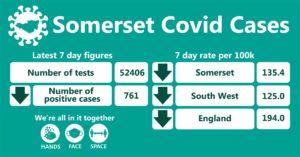This update is provided by the Somerset Covid-19 Engagement Board and is designed to provide a weekly update on the current Covid-19 situation in Somerset.
This update is provided by the Somerset Covid-19 Engagement Board and is designed to provide a weekly update on the current Covid-19 situation in Somerset.
As the vaccination programme continues to roll out across Somerset, anyone who is over 70 and has not yet had their vaccine, can now contact the NHS directly to book an appointment on this link: Book a coronavirus vaccination – NHS (www.nhs.uk).
Over 1, 275, 000 people in the South West have now been vaccinated, and that is wonderful progress. However, we must continue to stress how important it is for everyone to understand that while the vaccine is designed to prevent serious illness and death from Covid-19, anyone who has received the vaccine could still catch coronavirus and might still be able to pass it on to others. It takes between two and three weeks to build protection once you have had the vaccine, it isn’t instant protection. Therefore, we urge you to please keep adhering to the ‘Hands-Face-Space’ guidance in order to protect yourselves and others, and to share this important message with your networks.
This week we have included some information in the communications section of this update that will help to address some of the myths about the vaccine that are circulating. We hope that you will find these useful, and please do help us to combat the myths.
With half term next week, and increasingly lighter evenings, we appreciate that it may be tempting to go out more often and venture further from home. However, we are still under a national lockdown, so we urge everyone to stick to the stay at home rules, and help us all to stay safe and protect each other and our NHS.
‘Remember, everyone can catch it, anyone can spread it’.



| David Fothergill, Leader of Somerset County Council Twitter: @DJAFothergill | Trudi Grant, Director of Public Health Twitter: @SomersetDPH | Clare Paul, Cabinet Member for Public Health and Wellbeing Twitter: @Clarepaul_ |
Along with the rest of the UK, locally we are seeing rates coming down, however figures are still much higher than they were in early December, and Covid-19 is still very much circulating in our communities.
Somerset’s seven-day infection rate has decreased considerably from last week’s rate of 174.1 and now stands at 135.4 new cases per 100,000.

In the week leading up to 6 February, approximately 52406 tests were carried out across the county and there have been 761 new confirmed cases.
The number of tests has increased due to the ramp up of testing (in particular, the rapid testing programme) but importantly, the number of positive cases has again reduced since last week’s update.
The Somerset Dashboard which tracks our local epidemic from the start in March, to the current time:
Workplaces: Larger employers in Somerset can now order coronavirus tests for their workforce if they cannot work from home. The direct route for ordering rapid Lateral Flow Tests has been set up for employers with 50 or more staff in England. For more information visit the Gov.uk website.
Lateral flow tests are good at identifying people who don’t have symptoms and who may have infection when they may not otherwise have been picked up. However, they do not pick up all infections. This is why following a negative result, it is important that people continue to follow all national guidelines regarding social distancing, wearing face coverings and washing their hands regularly. The benefit of these tests is that they will identify some asymptomatic or pre-symptomatic positive cases, helping to break transmission chains. The downsides include the relatively high false negative rate, and the significant resources required to test the workforce repeatedly.
Care Sector: In the seven days to 2 February, there were 117 new cases at 47 care home settings. The positive cases identified were staff and residents; we continue to support these settings with support and guidance on prevention measures.
We are extremely pleased that the majority of care home residents have now received their first vaccination, helping to prevent serious illness from Covid-19 within this group. This is beginning to have an effect on outbreaks in our care settings, which are on a less serious scale than previously seen.
Care sector staff and residents have been severely impacted by Covid-19, both physically and emotionally. This is highlighted in a powerful film fronted by ex BBC Correspondent Clinton Rogers who, along with video diaries from staff, reports on the devastating impact Covid-19 has had on the residents and team at Linden House.
You can watch the film on this link: Somerset Covid Catch-Up – Week 10: Coronavirus and care – YouTube The film shows how we must continue to support the staff, residents and families connected to our care settings recover from the trauma they have, and continue to experience.
Other sources of support that are available for you, or someone you know, are as follows:
Mindline Emotional Support Helpline – phone 01823 276 892 (open 24 hours, 7 days a week)
Somerset Bereavement Support Service – phone 0800 304 7412 (open 9am-5pm, Monday to Saturday)
All of the recent guidance and advice for different care sectors is published by the Somerset Safeguarding adults board, and you can also sign up for a weekly email with all of the relevant updates being sent straight to you. If you would like to do that, visit the Safeguarding Somerset website.
Schools and Early Years settings: The national lockdown restrictions mean that only vulnerable children and those of key workers are receiving face to face learning, with other groups receiving learning at home and online.
Somerset schools are working hard to implement the Department for Education mass testing programme. Staff at secondary schools, colleges and special schools are now taking part in a twice weekly testing programme. Staff at primary schools and maintained nurseries now have access to home testing kits.
We are seeing some sporadic cases in educational settings and continue to work with schools to undertake risk assessments and provide public health advice. Next week is February Half Term and our education colleagues will be taking a well-earned break.
Communications:
Stay at home restrictions
We remain under a period of national lockdown, and as before, we encourage you to share the following poster with your networks to help explain the restrictions: England Lockdown: Stay At Home posters – GOV.UK (www.gov.uk)
Vaccine Hesitancy
We are aware that some people are very concerned about having the Covid-19 vaccine, because of things that they might have seen on social media or heard from friends. We would like to help you to address these myths with the following information:
- Some people are concerned that the Covid-19 vaccine might actually give them the virus. This is not the case – you cannot catch Covid-19 from the vaccine as none of the current vaccines available contain live virus and are therefore unable to cause disease. The vaccines contain a genetic code that our cells use to make a little bit of the Covid-19 virus which causes our immune system to produce antibodies and other anti-virus immune responses.
- Some people have concerns around whether the vaccine contains animal products. Vaccine manufacturers AstraZeneca and Pfizer/BioNTech have confirmed the vaccine does not contain any animal ingredients and no animal-derived cells were used.
- And for those who have heard rumours that the vaccination affects fertility there is no evidence to suggest that the vaccines affect fertility. The Public Health England guidance states there is absolutely no advice to avoid pregnancy after receiving the Covid-19 vaccination.
- In terms of pregnancy and breastfeeding, while there is no evidence to suggest that the vaccines could cause harm to a pregnancy, the vaccines have not yet been tested in pregnancy, so until more information is available, those who are pregnant should not routinely have this vaccine. There is no data on the safety of Covid-19 vaccines in breastfeeding or on the breastfed infant. Despite this, they are not thought to be a risk to the breastfeeding infant, and the benefits of breast-feeding are well known. Public Health England has recommended that the vaccine can be received whilst breastfeeding.
For more information on the NHS vaccination in Somerset please visit the NHS website.
For more information on the COVID-19 vaccine please visit the NHS website.
Testing
Testing is an important part of our fight against the spread of coronavirus, especially as one third of the people that catch it have no symptoms at all. This means that they can spread the virus without knowing, including to people who could become seriously ill. One type of test available is Lateral Flow Tests or LFTs. You may hear about these tests in relation to ‘community testing’ on the news. Locally, community testing is currently only available to specific groups that cannot work from home and who are in contact with our most vulnerable residents most at risk of becoming seriously ill from Covid-19.
A national testing programme is supporting other settings with this offer such as schools, certain business and care homes. This type of test is very good at identifying people who have lots of the virus, and are infectious on the day, but isn’t as good at finding the virus in people who aren’t infectious yet (i.e. early in the infection) therefore it is very important to note that it is possible to receive a negative test, but actually be carrying the virus.
For this reason, anyone using LFT tests should ideally be tested twice a week and should also keep adhering to the ‘Hands-Face-Space’ guidance and remember to ventilate households or workplaces.
For more information on how to get a test, follow this link: Coronavirus – Getting tested (somerset.gov.uk)
The importance of ventilation
We are continuing to reinforce the importance of ventilation in combating Covid-19. Covid-19 spreads from person to person through small droplets, clouds of tiny airborne particles known as aerosols and through direct contact.
In addition to social distancing and other measures, you can also reduce the risk of spreading Covid-19 by:
- Letting plenty of fresh air into your home or room without getting uncomfortably cold if you have people working in or visiting you (only where permitted). You should do this during their visit and after they leave
- Avoid coming into contact with people in spaces with limited flow of fresh air such as rooms with windows that are never opened
To increase the flow of air you can:
- open windows as much as possible
- open doors
- make sure that any vents (for example at the top of a window) are open and airflow is not blocked
- leave extractor fans (for example in bathrooms) running for longer than usual with the door closed after someone has used the room
Resources and further information:
Please do keep an eye our Healthy Somerset website, which has a huge amount of information and resources to help keep everyone healthy happy and safe at this time.
For the latest local information as well as digital resources, posters and flyers please visit the Somerset County Council website.
The Somerset Local Outbreak Management Plan outlines how we, the council, will work with the NHS Test and Trace Service, PHE, the NHS and other partners to ensure a whole system approach to preventing and managing local outbreaks. This can be found here.
Finally, please like them on Facebook, follow them on Twitter and share their posts with your networks to help them in communicating these important messages. Follow their Director of Public Health account too here.

